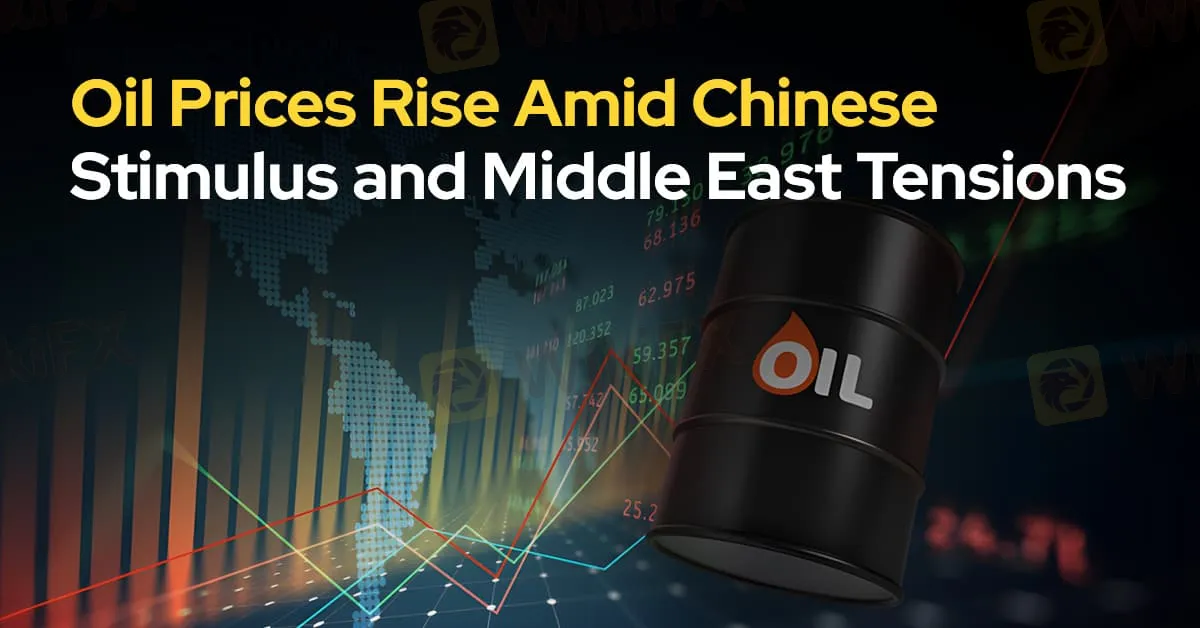简体中文
繁體中文
English
Pусский
日本語
ภาษาไทย
Tiếng Việt
Bahasa Indonesia
Español
हिन्दी
Filippiiniläinen
Français
Deutsch
Português
Türkçe
한국어
العربية
Oil Prices Rise Amid Chinese Stimulus and Middle East Tensions
Abstract:According to report, oil prices experienced a notable increase this week, with Brent crude climbing above $74 a barrel after a period of volatility.

Oil prices experienced a notable increase this week, with Brent crude climbing above $74 a barrel after a period of volatility. This rise follows a series of aggressive economic measures introduced by Chinese authorities, aimed at revitalizing the nations slowing economy. Meanwhile, escalating tensions in the Middle East, particularly involving Israel and Hezbollah, have contributed to the market's volatility.
After dipping by 0.8% on Monday, West Texas Intermediate was trading close to $71. The boost in prices can be attributed to recent announcements from Pan Gongsheng, the governor of the People's Bank of China, who outlined a comprehensive strategy to achieve the country's growth target of around 5% for the year. Key initiatives include enhanced lending capabilities for financial institutions and a reduction in the central bank's short-term interest rates, which are expected to stimulate both economic growth and energy demand in the worlds largest oil consumer.
According to Han Zhong Liang, an investment strategist at Standard Chartered Plc in Singapore, “These measures could positively impact China's demand for oil. The real challenge will be how effectively these lower rates translate into real economic activity.”
Conversely, the oil market is grappling with concerns about a faltering Chinese economy and the potential for increased supply from OPEC+, which has resulted in a 14% decline in prices over the past quarter.
In parallel, the geopolitical landscape has become increasingly tense as Israel launched a series of strikes against Hezbollah positions in southern Lebanon, leading to approximately 500 fatalities—marking the deadliest day of conflict since the 2006 war. Although Iran, a key ally of Hezbollah, has expressed a desire to de-escalate, the situation remains volatile.
As the market reacts to these dual pressures from economic policy and geopolitical tensions, the direction of oil prices will heavily depend on developments in China and the stability of the Middle East shortly.

Disclaimer:
The views in this article only represent the author's personal views, and do not constitute investment advice on this platform. This platform does not guarantee the accuracy, completeness and timeliness of the information in the article, and will not be liable for any loss caused by the use of or reliance on the information in the article.
Read more

A Trader’s Worst Mistake: Overlooking Broker Reviews Could Cost You Everything
In today’s digital age, reviews influence nearly every decision we make. When purchasing a smartphone, television, or home appliance, we pore over customer feedback and expert opinions to ensure we’re making the right choice. So why is it that, when it comes to choosing an online broker where real money and financial security are at stake many traders neglect the crucial step of reading reviews?

Bank Negara Malaysia Flags 12 New Companies for Unauthorised Activity
Bank Negara Malaysia (BNM) has updated its Financial Consumer Alert List (FCA List) by adding 12 more entities, reinforcing its efforts to warn the public against unregulated financial schemes. Check if your broker made the list!

TradingView Brings Live Market Charts to Telegram Users with New Mini App
TradingView has launched a mini app on Telegram, making it easier for users to track market trends, check price movements, and share charts.

Will natural disasters have an impact on the forex market?
The forex market is known for its rapid responses to global events, but the influence of natural disasters, such as earthquakes and typhoons, can be less straightforward. While headlines may scream about catastrophic damage and economic disruption, the long-term effects on currency values often depend on a blend of immediate shock and underlying economic fundamentals.
WikiFX Broker
Latest News
TradingView Brings Live Market Charts to Telegram Users with New Mini App
Trump tariffs: How will India navigate a world on the brink of a trade war?
Interactive Brokers Launches Forecast Contracts in Canada for Market Predictions
Authorities Alert: MAS Impersonation Scam Hits Singapore
Stocks fall again as Trump tariff jitters continue
INFINOX Partners with Acelerador Racing for Porsche Cup Brazil 2025
Regulatory Failures Lead to $150,000 Fine for Thurston Springer
April Forex Trends: EUR/USD, GBP/USD, USD/JPY, AUD/USD, USD/CAD Insights
March Oil Production Declines: How Is the Market Reacting?
Georgia Man Charged in Danbury Kidnapping and Crypto Extortion Plot
Currency Calculator







